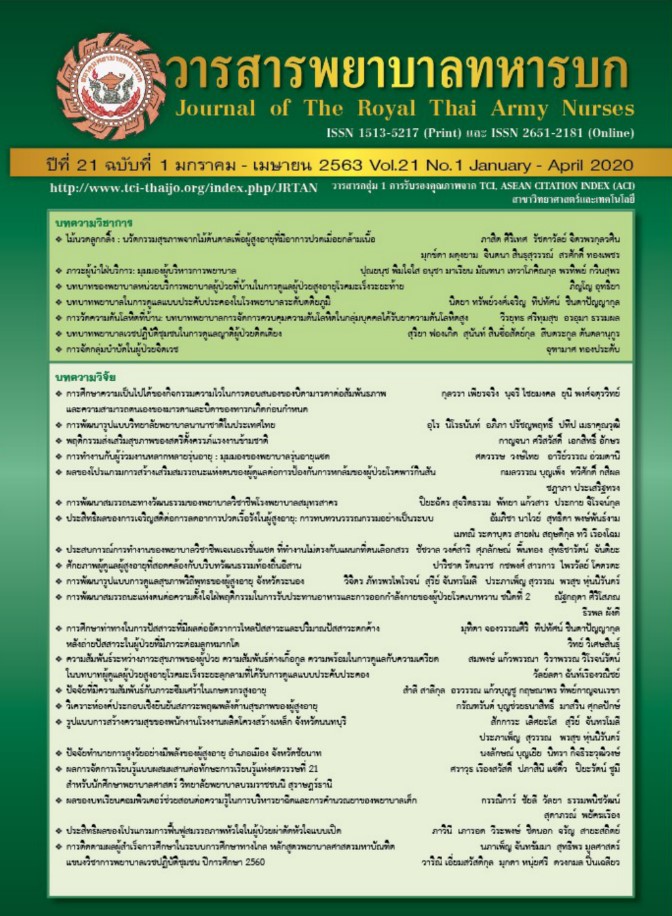A Development of Attention Game in Primary School Students
Keywords:
Attention, Attention GameAbstract
The study was a quasi - experimental research which aimed at investing a development of attention game for primary school students. The subjects were 60 students which were obtained from the selection with an Attention Network Test (ANT). Random assignment was used to assign the samples into the experimental group and the control group, with 30 subjects in each group. The instruments used were an Attention Network Test: ANT, and an attention game developed by the researcher based on the concept of Attentional network and Bloom’s Taxonomy. There were 10 sessions in the experiment, each session last for 50 minutes, for a total of four weeks. The experiment was divided into three phrases-before the experiment, after the experiment, and the follow-up period. Data were analyzed using the repeated measures analysis of variance: one between-subjects variable and one within-subjects variable When differences were detected, the Bonferroni procedure was employed. The findings revealed that.
1. After the experiment and the follow up after 3 weeks the primary school students in the experimental group had less total errors than those of the control subjects with statistical significance at .05 level.
2. After the experiment and after the follow up the experimental subjects had less total errors before the experiment with statistical significance at .05 level.
Downloads
References
2. Voon, D., Hasking, P., & Martin, G. The roles of emotion regulation and ruminative thoughts in non-suicidal self-injury. British Journal of Clinical Psychology 2014;53(1):95-113.
3. Luders, E., Toga, A. W., Lepore, N., & Gaser, C. The underlying anatomical correlates of long-term meditation: larger hippocampal and frontal volumes of gray matter. Neuroimage 2009;45(3):672-678.
4. Cain, M. S., Landau, A. N., & Shimamura, A. P. Action video game experience reduces the cost of switching tasks. Attention, Perception, & Psychophysics 2012;74(4), 641-647.
5. Oldfield, R. C. The assessment and analysis of handedness: the Edinburgh inventory. Neuropsychologia 1971;9(1):97-113.
6. Yi-Feng Wang, Xiu-Juan Jing, Feng Liu, Mei-Ling Li, Zhi-Liang Long, Jin H. Yan & Hua-Fu Chen. Reliable Attention Network Scores and Mutually Inhibited Internetwork Relationships Revealed by Mixed Design and Non-orthogonal Method. Journal of The Scientific Report.; 2015
7. Howell, D. C. Statistical methods for psychology. 8 ed., 464-466.;2013
8. Posner, M. I., & Petersen, S. E. The attention system of the human brain. Annual Review of Neuroscience 1990;13(1):25-42.
9. Panyencheun, W. Development of Program to Promote Attention Based on Neuro-Linguistic Programming in Primary School Students. Journal of The Royal Thai Army Nurses 2019; 20(3):305-312. (In Thai)
10. Paungkate, N. The Effect of Watching Thai Short Films on the Attention Span of Adolescents: An Event-Related Potentials Study [Doctor of Philosophy]. Research and statistics in cognitive science, College of Research Methodology and Cognitive Science, Burapha University; 2559 (In Thai)
11. Valenzuela M, S. P. Can cognitive exercise prevent the onset of dementia? Systematic review of randomized clinical trials with longitudinal follow-up. The American journal of geriatric psychiatry: official journal of the American Association for Geriatric Psychiatry 2009;17(13): 179-187.
12. Haenjohn, J., Sirithadakunlaphat, S., & Supwirapakorn, W. Development of training on promoting executive functions of the brain in adolescent, Journal of The Royal Thai Army Nurses 2018; 19(2): 220-229. (In Thai)
Downloads
Published
How to Cite
Issue
Section
License
บทความหรือข้อคิดเห็นใดใดที่ปรากฏในวารสารพยาบาลทหารบกเป็นวรรณกรรมของผู้เขียน ซึ่งบรรณาธิการหรือสมาคมพยาบาลทหารบก ไม่จำเป็นต้องเห็นด้วย
บทความที่ได้รับการตีพิมพ์เป็นลิขสิทธิ์ของวารสารพยาบาลทหารบก
The ideas and opinions expressed in the Journal of The Royal Thai Army Nurses are those of the authors and not necessarily those
of the editor or Royal Thai Army Nurses Association.






